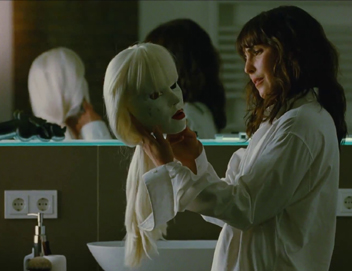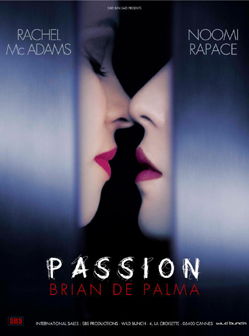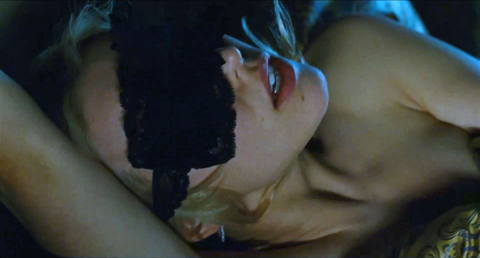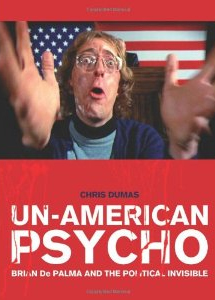'THE WORLD WITHOUT BRANDO' EPISODE COVERS 'OBSESSION', 'DRESSED TO KILL', & 'BLOW OUT'
 Hello and welcome to the unofficial Brian De Palma website. Here is the latest news: |
|---|
E-mail
Geoffsongs@aol.com
-------------
Recent Headlines
a la Mod:
Listen to
Donaggio's full score
for Domino online
De Palma/Lehman
rapport at work
in Snakes
De Palma/Lehman
next novel is Terry
De Palma developing
Catch And Kill,
"a horror movie
based on real things
that have happened
in the news"
Supercut video
of De Palma's films
edited by Carl Rodrigue
Washington Post
review of Keesey book
-------------
Exclusive Passion
Interviews:
Brian De Palma
Karoline Herfurth
Leila Rozario
------------
------------
| « | September 2012 | » | ||||
| S | M | T | W | T | F | S |
| 1 | ||||||
| 2 | 3 | 4 | 5 | 6 | 7 | 8 |
| 9 | 10 | 11 | 12 | 13 | 14 | 15 |
| 16 | 17 | 18 | 19 | 20 | 21 | 22 |
| 23 | 24 | 25 | 26 | 27 | 28 | 29 |
| 30 | ||||||
De Palma interviewed
in Paris 2002
De Palma discusses
The Black Dahlia 2006

Enthusiasms...
Alfred Hitchcock
The Master Of Suspense
Sergio Leone
and the Infield
Fly Rule
The Filmmaker Who
Came In From The Cold
Jim Emerson on
Greetings & Hi, Mom!
Scarface: Make Way
For The Bad Guy
Deborah Shelton
Official Web Site
Welcome to the
Offices of Death Records
 Despite the negotiations with IFC Films revealed this past Monday, Entertainment One (also known as eOne Entertainment) announced today that it has acquired the North American rights to distribute Brian De Palma's Passion. Variety, Hollywood Reporter, Screen Daily, and Deadline all reported the news, adding that Passion will be released in theaters in early 2013. (I got a pretty big laugh out of The Wrap's Brent Lang stating that "it's been over a decade since De Palma was a critics' darling." Was he ever so loved by what we might call "the critics"?)
Despite the negotiations with IFC Films revealed this past Monday, Entertainment One (also known as eOne Entertainment) announced today that it has acquired the North American rights to distribute Brian De Palma's Passion. Variety, Hollywood Reporter, Screen Daily, and Deadline all reported the news, adding that Passion will be released in theaters in early 2013. (I got a pretty big laugh out of The Wrap's Brent Lang stating that "it's been over a decade since De Palma was a critics' darling." Was he ever so loved by what we might call "the critics"?)
 Peter Labuza and Simon Abrams begin a special NYFF episode of the Cinephiliacs podcast with a stimulating discussion of Brian De Palma's Passion. They delve into the characters' manipulation of digital images, as well as the use of color in the film. Abrams also discusses how he thinks there is a lot of interesting things going on in the first half of the film, contrary to the seemingly popular view that the film only picks up in its second half.
Peter Labuza and Simon Abrams begin a special NYFF episode of the Cinephiliacs podcast with a stimulating discussion of Brian De Palma's Passion. They delve into the characters' manipulation of digital images, as well as the use of color in the film. Abrams also discusses how he thinks there is a lot of interesting things going on in the first half of the film, contrary to the seemingly popular view that the film only picks up in its second half.

 I know there are a few interviews I still need to link to from the other festivals (Part Two of the interview roundup is coming soon, for sure!), but Jack Giroux at Film School Rejects got a chance to interview Brian De Palma prior to the start of the New York Film Festival, and, well, it's fresh.
I know there are a few interviews I still need to link to from the other festivals (Part Two of the interview roundup is coming soon, for sure!), but Jack Giroux at Film School Rejects got a chance to interview Brian De Palma prior to the start of the New York Film Festival, and, well, it's fresh.I think my career has met every challenge imaginable. [Laughs] I’ve tried every form that’s out there except the western. I love the landscapes of the western.
Have you ever been interested in doing a western?
I’d do one, absolutely.
A theme in some of your work is characters feeling trapped, even in something like Snake Eyes. For Passion, you use that barred-in widow shades effect, so do you think it fits that theme?
We don’t really think about it like that. We sort of address the aesthetic problems of the piece. For Snake Eyes, the whole idea was you never leave the casino, which is the same idea that a casino never wants you to leave. For other films, the landscapes are very important. I think about them all the time, because I’m very scrupulous in finding visuals that illustrate and magnify the themes in the film. The world the girls live in is a very important location.
Obviously a lot of those visuals come from your dreams. What dreams did you use for Passion?
I myself get a lot of ideas from my dreams. I wake up many times during the night thinking about certain aesthetic problems, which sort of figure themselves out in my dream. For this movie, I got the idea of the phone commercial in a dream. With this I was always thinking, “How am I going to end it?” I decided to go with this whole extended dream sequence.
The last time you made a thriller you deconstructed the genre with Femme Fatale. For this, did you want to do the same or make a straight thriller?
The problem with this is it’s a police procedural in many ways. I felt what was effective about the original movie was the first scene revealed who did it. After that, then it’s seeing how all these phony clues were set up, which I didn’t find all that interesting. Actually, I looked at 10 years of CSI, to see how exactly they use clues to solve cases. I said, “My God, this has been done to death 1,000 different ways.” You can’t do a police procedural in a movie anymore. Television has already done it 27 different ways. I had to come up with a way to make the confession seem absolutely real, but then get into the surreal world.
I haven’t done any police procedurals, because it’s usually people talking to the accused at a table holding up evidence. Besides having to shoot that, I have to find a way to make this interesting. Also, having to simplify the clues. In the original movie, she left four clues, four things that had to be deconstructed. I just got it down to the bloody scarf, to make it as simple as possible.
Yeah, it was. It was a very complicated three-dream level Inception.
That’s interesting, since you’re known for classical influences. How often do you find yourself inspired by modern films?
Well, I’m inspired by anything that touches my imagination, which is why I think I’m the only living director who actually goes to film festivals to see the movies. I’m looking at stuff all the time. I go see the movies that rarely get into this country. I’m interested in what everyone else is doing. When I see what I consider an interesting idea, it’s, like, “Wow!”
What do you usually look for in those festival films?
The great thing about the film festivals in Montreal and Toronto is the ability to move in and out of the theater if you’re seeing things that don’t interest you. I only had a few days to look at films in Toronto, but, I don’t know, I looked at seven films in one afternoon. If I see nothing there that catches my eye, I’ll just move on to the next movie. I’m going to the movie that nobody usually attends. I don’t go to the big tickets, because I can see those in New York. I want to see the ones which are really strange and only have ten people in the theater. I go completely by chance, since I don’t read extensive reviews or introductions. I usually just go, “This sounds sort of interesting.”
You’ve mentioned being a big admirer of his, so I have to ask, did you get a chance to see The Master in Toronto?
No, I didn’t, unfortunately. I’m an admirer of Paul [Thomas Anderson]‘s, obviously. I thought Magnolia was fantastic. I’m the one who understands the films completely.
[Laughs] There’s already been a lot of debate over what The Master means as well.
Well, when you’re pushing the envelope, that’s what’s going to happen.
You shot Passion on film, which is always surprising now. Why didn’t you go with digital?
The reason we shot on film is…I mean, it has a lot of beautiful women. On film you can light them beautifully. I’m sure that’ll change. Digital doesn’t lend itself to the class of beautiful lighting. I chose the cinematographer specifically because he knows how to light women. I like beautiful women, dressing them, and making them look as beautiful as they can.

"This is not a documentary, but it's a way to understand me in a fantastical way," Peaches explained to Rolling Stone's Karen Bliss. "It's also subversive – an anti-jukebox musical. Actually, the songs relate more to what they're actually about in the musical than something like Mamma Mia, where they make up another story, or We Will Rock You, where [they have] this cheesy future crap. There's enough of a story there for me to have originality, but I also – not even parodied, but gave homage to all my favorite musicals. Like the speech at the beginning, the professor – that's kind of borrowed from The Rocky Horror Picture Show and the scene 'I Feel Cream,' when they bring in all the sets and all of a sudden we're in love. That to me is so Singin' in the Rain, An American in Paris, all those Gene Kelly [and] Fred Astaire movies."

(Courtesy of Go Into The Story's Scott Myers.)
 J. Hoberman posted about Brian De Palma's Passion on his Blouin ArtInfo blog today, ahead of the start of the New York Film Festival this Friday. Hoberman calls Passion "sleek, slick, humorously kinky," and suggested that the film continues the play with cinematic forms De Palma displayed in his previous film, Redacted. Hoberman also takes a look at Chris Dumas' book, Un-American Psycho: Brian De Palma and the Political Invisible, and finds that Passion is a good example of Dumas' conception of De Palma as "a sort of intuitive film theorist who, like Peckinpah and Coppola before him, has reached a place where he can only make movies that are allegories for making movies." Here's how Hoberman lays it out:
J. Hoberman posted about Brian De Palma's Passion on his Blouin ArtInfo blog today, ahead of the start of the New York Film Festival this Friday. Hoberman calls Passion "sleek, slick, humorously kinky," and suggested that the film continues the play with cinematic forms De Palma displayed in his previous film, Redacted. Hoberman also takes a look at Chris Dumas' book, Un-American Psycho: Brian De Palma and the Political Invisible, and finds that Passion is a good example of Dumas' conception of De Palma as "a sort of intuitive film theorist who, like Peckinpah and Coppola before him, has reached a place where he can only make movies that are allegories for making movies." Here's how Hoberman lays it out:"De Palma may be an inveterate trickster but his compulsion to extra-textualize Corneau’s original is both a way of taking ownership of the material and a form of free-association less rigorous than, but not unlike, Raymond Roussel’s method for composing his surreal novels. Thus, Passion’s split screen set piece, involves both a slyly seductive performance of the ballet Afternoon of a Faun and an obscurely unfolding criminal plan, mainly because both (as will only later be clear) hinge upon stolen scarfs.
"It was while in Toronto, browsing the well-stocked bookstore at the TIFF Bell Lightbox Theatre, that I discovered Chris Dumas’s high-powered, witty, and provocatively (as well as suitably) disreputable Un-American Psycho: Brian De Palma and the Political Invisible. Dumas, who writes like a PhD student who wise-guyed himself out of film school, Dumas clearly identifies with his subject. By his logic, it was precisely because De Palma — a cineaste of the ’60s and thus contemporary to the whole Cinema Studies enterprise — took it upon himself to rewrite, or travesty, the two Cinema Studies deities Hitchcock and Godard, that his oeuvre has found so little academic support. (In that sense, Un-American Psycho is something like the return of the Cinema Studies 'repressed.')
"Dumas’s De Palma is a sort of intuitive film theorist who, like Peckinpah and Coppola before him, has reached a place where he can only make movies that are allegories for making movies. Blatantly global, predicated on theft and betrayal (as well as plots and image-making), Passion is a case in point.
"In the best of all possible worlds, De Palma would only direct remakes and all remakes would be directed by him. Still, it is strange that this one has yet to find a US distributor. Can an openly commercial mocksploitation film possibly be too cerebral? As Oscar Wilde observed, 'There is always something ridiculous about the passions of people whom one has ceased to love.'”
 Meanwhile, someone who is not so impressed with Dumas' book is Adrian Martin, who, in a review posted in the current edition of Screening The Past, states that the book "is full of sloppy, careless mistakes," and "poorly constructed as an argument." For examples of the mistakes, Martin writes, "The bibliography lists Tony Conrad as the author of The Hitchcock Murders – Tony Conrad, the 'underground' filmmaker, wow! Alas, it’s really that old fogey, Peter Conrad. In a chapter devoted to Godard, James Roy MacBean is described as a once-regular contributor to Film Comment – ah, that would be Film Quarterly. Godard’s films Numéro Deux and Ici et Ailleurs are dated as 'early 1970s' – they are 1975 and 1976, respectively. And on and on it goes."
Meanwhile, someone who is not so impressed with Dumas' book is Adrian Martin, who, in a review posted in the current edition of Screening The Past, states that the book "is full of sloppy, careless mistakes," and "poorly constructed as an argument." For examples of the mistakes, Martin writes, "The bibliography lists Tony Conrad as the author of The Hitchcock Murders – Tony Conrad, the 'underground' filmmaker, wow! Alas, it’s really that old fogey, Peter Conrad. In a chapter devoted to Godard, James Roy MacBean is described as a once-regular contributor to Film Comment – ah, that would be Film Quarterly. Godard’s films Numéro Deux and Ici et Ailleurs are dated as 'early 1970s' – they are 1975 and 1976, respectively. And on and on it goes."Dumas responds: "As a longtime fan of the music of Tony Conrad, I am truly ashamed to have carelessly cited him as the author of Peter Conrad's dreadful The Hitchcock Murders. I hope Tony can forgive me. -- Chris Dumas"
Another error in the book involves De Palma's Obsession, which Dumas describes as one of De Palma's works for hire ("he neither originated the project nor wrote the script"). Of course, De Palma did originate the project, and in fact Paul Schrader's screenplay is based on a story by Schrader and De Palma. When I asked Dumas about this, he said someone else had told him the same thing, and acknowledged that the error left a hole in the book's thesis that he hopes to retrospectively correct with a potential presentation in the near future. One of Martin's biggest problems with Dumas' book is the dismissal of Obsession, "in my opinion one of De Palma’s greatest and most powerful works," states Martin. Referring to the book's title (which itself reflects Dumas' thesis that Film Studies cannot "see" De Palma because his cinema is exactly what Film Studies strives to be), Martin adds, "Talk about a blind spot!"
For myself, despite the mistakes, Dumas' book provides a unique view of De Palma that correctly identifies Godard as the basis from which to understand De Palma's continued "use" of Hitchcock (or, to paraphrase Dumas, De Palma's developed operation of the Hitchcock machine, which Dumas states is understood "as the sum of Hitchcock's appropriable narrative and technical gestures"). Dumas analyzes the way the Godardian, political De Palma turned toward Hitchcock's grammar as a way to develop his own filmmaking skills. "De Palma, therefore," states Dumas, "becomes not a 'Hitchcockian' - the way that, say, M. Night Shyamalan has become a 'Hitchcockian' - but, rather, takes on the operation of the Hitchcock machine as un Godardiste." In this vein, Dumas further posits the idea of De Palma as film theorist, and at one point suggests that Raising Cain might also have been called "Some Thoughts on Hitchcock's Authorship." Martin himself admits that he can "see some small truth" in Dumas' thesis, but feels that Dumas is prone to overstatement.
The book also includes well-selected and juxtaposed stills, mostly from De Palma films, but also some other directors here and there. (Martin himself finds the series of stills featuring faces returning the camera's gaze, such as the still of William Finley that graces the book's cover, the book's highlight.) I also appreciate a book such as this for those instances in which it brings to light a reference in a De Palma film that I may never have thought to look at otherwise, such as when Dumas notes the influence of Anthony Mann on De Palma's The Untouchables and Femme Fatale (Dumas suggests that the latter's "supremely illogical dream structure" is "clearly borrowed from Strange Impersonation," a claim I have yet to investigate for myself).
A.V. Club's John Semley also appreciates the book's close readings of De Palma's films, stating it is one of the "great strengths of Dumas' theorizing."
ZIZEK ON 'REDACTED' One other note of interest regarding Dumas' book: Slavoj Žìzek is presented as "un Lacaniste" who makes the mistake of operating the Hitchcock machine while ignoring De Palma, who, as a theorist in his own right, entered Hitchcock studies prior to Žìzek. Prior to the completion of Dumas' manuscript, Žiz̀ek had never once seemed to have mentioned or written about De Palma. However, in his latest book, Living In The End Times (2010), Žiz̀ek spends a paragraph with De Palma's Redacted, in the context of a discussion of U.S. military interventions around the globe. Below is that paragraph and, for context, parts of the ones that surround it on pages 174-175:
One other note of interest regarding Dumas' book: Slavoj Žìzek is presented as "un Lacaniste" who makes the mistake of operating the Hitchcock machine while ignoring De Palma, who, as a theorist in his own right, entered Hitchcock studies prior to Žìzek. Prior to the completion of Dumas' manuscript, Žiz̀ek had never once seemed to have mentioned or written about De Palma. However, in his latest book, Living In The End Times (2010), Žiz̀ek spends a paragraph with De Palma's Redacted, in the context of a discussion of U.S. military interventions around the globe. Below is that paragraph and, for context, parts of the ones that surround it on pages 174-175:
"No wonder that Brian De Palma's Redacted was boycotted by the US public: it portrays rape and murder as part of the US army's obscene subculture, a form of 'group solidarity' in collective transgression. The supreme irony is that the gang rape incident which the film stages happened in the summer of 2006 in Samara-- and the film makes a reference to the 'Appointment in Samara' story, nicely left half untold. This legend was retold by W. Somerset Maugham: a servent on an errand in the busy market of Baghdad meets Death; terrified by its gaze, he runs home to his master and asks for a horse, so that he can ride all day and reach Samara, where Death will not find him, in the evening. The good master not only provides the servent with a horse, but goes to the market himself, looking for Death to reproach it for scaring his faithful servant. Death replies: 'But I didn't want to scare your servant. I was just surprised at what was he doing here when I have an appointment in Samara tonight...' What if the message of this story is not that a man's demise is impossible to avoid, that trying to twist free of it will only tighten its grip, but rather the exact opposite, namely that if one accepts fate as inevitable then one can break its grasp?
"It was foretold to Oedipus's parents that their son would kill his father and marry his mother, but the very steps they took to avoid this fate (exposing him to death in a deep forest) ensured that the prophecy would be fulfilled-- without their attempt to avoid fate, fate could not have realized itself. Is this not a clear parable of the fate of the US intervention in Iraq? The US saw the signs of the fundamentalist threat, intervened to prevent it, and thereby massively strengthened it. Would it not have been much more effective to accept the threat, ignore it, and thus break its grasp?"